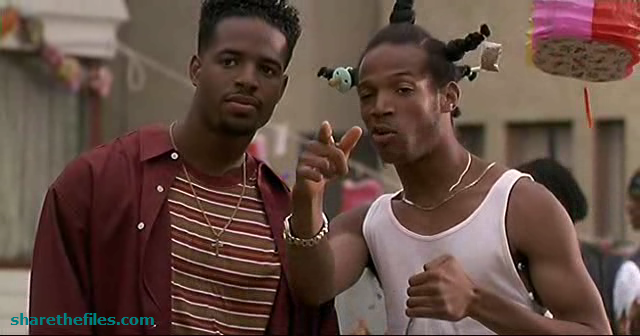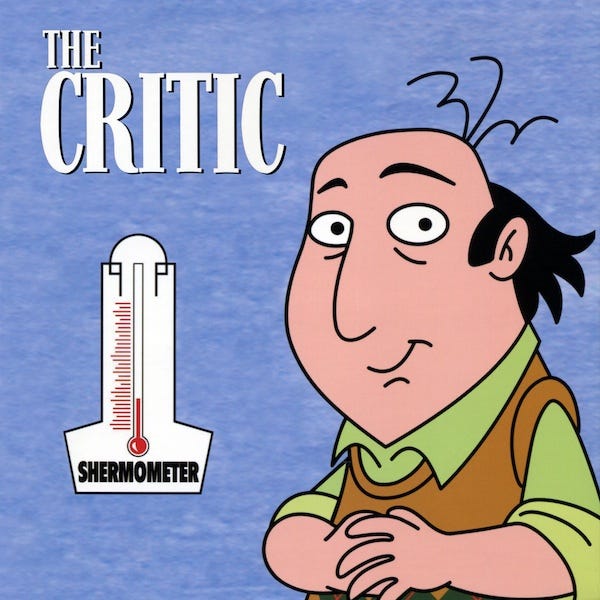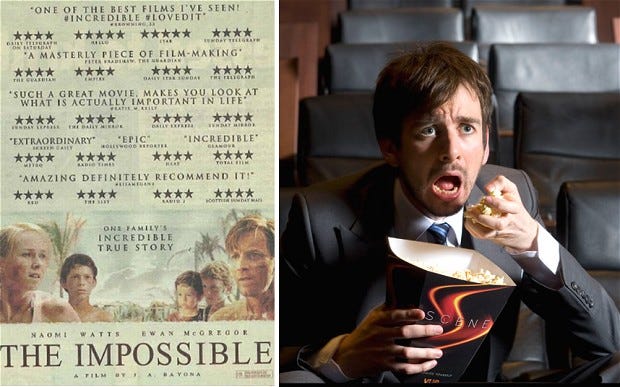 |
|
Either
they don’t know… or don’t show or just don’t care…
about
bein’ a menace to South Central
while they drink their juice in the hood.
|
It was 1996, two
men are sitting down talking about the nature of comedy and how it is used to
bring to light the issues of race and stereotypes. The movie in question?
“Don’t Be A Menace In South Central While Drinking Your Juice In The
Hood”. The two men? Siskel and Ebert on their show, “At The Movies”. In four
minutes, these two film critics had an intelligent discussion about a satirical
film that could have easily been dismissed as just another “ghetto” film. And
if that wasn’t enough, Ebert, in a very honest moment says that he’s unsure how
he feels about the film. Imagine that? A critic who didn’t “criticize” the
film, but rather took the highs and the lows and weighed them for what they
were.
 |
|
I
love French films,
pretentious boring French films!
I love French Films, two tickets s’il
vous plaît!
|
The role of the
critic is a thankless one. These are folks who usually go to school to study
the particular field that they are into. They take the history of
such-and-such, they read, they partake, they pour themselves all over the
medium, yet they don’t create anything but an opinion.
Who chooses to be
a critic? No, really, I’m asking. Who purposely decides that they want to look
at art and pull apart every aspect of it until nothing remains?
I used to think
these people were all frustrated artists, the very epitome of “those who
cannot, teach”. But the fact is, a true critic unabashedly loves every aspect
of their genre, and will be damned to see it sullied by those who would coast
on passable material. At least, that’s how it started.
So, I could go
back into the history of the critic, specifically the film critic, but it’s
pretty much only interesting to people who are critics. Let’s just say that at
one point is was only done by a few people, and that it only got huge when two
guys came on TV to share their opinions on films.
There was an
explosion of film critics in the ‘80s. And what made them fascinating is the
fact that they grew up in a time where “Hollywood Legends” were pretty much
accessible. These were journalists who in the ‘60s and ‘70s talked to actors
and filmmakers directly. There was a rapport that seems artificial when you
watch critics today.
We watched what
they had to say and for the most part listened. I know I had my opinions swayed
by a critic here and there without giving the film a chance. And why wouldn’t
I? These are professionals, right?
In the Summer of
2000, a critic came around by the name of David Manning. David had some great
things to say about certain movies. According to David, “A Knight’s Tale”,
starring Heath Ledger described him as “this year’s hottest new star!” Now, I
personally agree with David, I loved the hell out of this movie and frankly, I
think it was Heath’s best performance outside of The Joker.
Yup, David loved a
lot of movies, curiously, only films made by Sony, but it would soon come to
light why. David wasn’t real. David Manning was a pseudonym used by a marketing
executive working for the Sony Corporation. They created a fake critic to give
their films positive reviews.
Sony wasn’t the
only studio at fault for fake criticism. One critic’s review of “Live Free
or Die Hard” was shortened from “hysterically overproduced and
surprisingly entertaining” to “hysterically… entertaining.”
And of course,
there are the junkets, the free screenings, the food, the accomodations to
wherever, the goodies. Studios would do just about everything to get a positive
review from these people whom apparently held the keys to the opinions of the
common man. But the common man’s (or rather, those who didn’t get kickbacks to
watch a movie) voice became the death knell of the critic. Because the
internet.
There is no secret
that when social media hit, everyone with access became just that little bit
louder. And by a little bit louder, I mean everyone felt that their opinion had
to be typed in boldfaced fonts and youtubed from their bedrooms, shirtless,
sometimes bottomless.
Sites like
metacritic became the go-to go-to for what regular folks thought of films. The
professional critic slowly became something to be scoffed at, ridiculed, and
even mocked. People began to see them as archaic. Even filmmakers began to
question why should critics have their opinions held in higher regard than
anyone else?
Slowly, the
hashtag started to creep onto film posters. The voice of the people was now
visible in commercials, in the theaters, and of course online. The professional
critic was relegated to blogs and the few websites that still catered to that
kind of thing.
The critic was
dead. Long live (for better or for worse) the new critic! The very loud, noisy,
at times incomprehensible critic!
There is no
arguing that the hashtag has become the means in which most people garner
opinions. The live-tweet is just a torrent of short one-liners, not unlike the
taglines from the movie posters. And although everyone has their opinion, and
everyone is entitled to one. A part of me feels that not every opinion is
created equal. There is something to be said about a person who studies a
particular craft, and can tell you with a learned opinion about what a
filmmaker tried to convey; versus someone who went to watch a movie and didn’t
understand why the sex scene was filmed in the way it was, but tweeted, #DAT
ASS.
I recently posted
(in another blog) that I’ve yet to see
“Godzilla”. However, I’ve had some friends tell me they loved it, and others
tell me it was terrible. I tend to lean to those who I know have a bit of film
knowledge. Is it snobbery? I don’t think wanting an opinion from someone who is
“in the know” is such a bad thing. But for a lot of people, critics are shit.
And at the end of the day, a person is going to enjoy what they enjoy despite
of what other people say. Still, I have to say I do miss an educated opinion,
not necessarily to sway me, but to start a conversation. And that above all, is
what I feel is missing in today’s new critic. Everyone’s yelling, and no one’s
listening.

1 comment:
I want to share a testimony on how Le_Meridian funding service helped me with loan of 2,000,000.00 USD to finance my marijuana farm project , I'm very grateful and i promised to share this legit funding company to anyone looking for way to expand his or her business project.the company is UK/USA funding company. Anyone seeking for finance support should contact them on lfdsloans@outlook.com Or lfdsloans@lemeridianfds.com Mr Benjamin is also on whatsapp 1-989-394-3740 to make things easy for any applicant.
Post a Comment